A tiger in a New York zoo has tested positive for coronavirus and three others are showing symptoms of the highly contagious respiratory infection.
Nadia, a four-year-old female Malayan tiger, and three African lions had developed a dry cough at the Bronx Zoo located within the Bronx Park.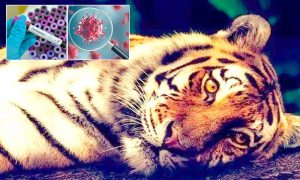
The US Department of Agriculture, which confirmed Nadia’s test result at its veterinary lab, believes it is the first known coronavirus infection in an animal in America or a tiger anywhere in the world.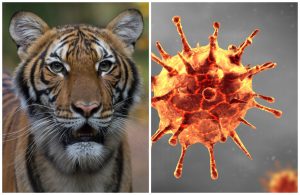
The tigers experienced some decrease in appetite but are otherwise “doing well under veterinary care and are bright, alert and interactive with their keepers”.
Bronx zoo
We tested the cat [Nadia] out of an abundance of caution and will ensure any knowledge we gain about COVID-19 will contribute to the world’s continuing understanding of this novel coronavirus,” the zoo said.
It said it will continue to monitor the cats closely and anticipates full recoveries, adding that none of the zoo’s other big cats including snow leopards, cheetahs, a clouded leopard, Amur leopard and a puma were showing any signs of illness.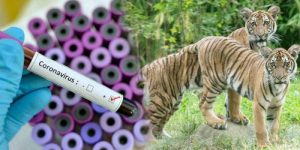
Coronavirus has infected more than 1.2 million people across the world and at least 69,451 have died with the disease.
It is believed the virus was first transferred to people at a food market that trades wildlife in Wuhan, China.
The zoo’s statement added: “There is no evidence that animals play a role in the transmission of COVID-19 to people other than the initial event in the Wuhan market, and no evidence that any person has been infected with COVID-19 in the US by animals, including by pet dogs or cats.”
None of the zoo’s other big cats are showing any signs of illness. All the tigers showing symptoms were housed in the zoo’s Tiger Mountain area. It is unclear if the others will be tested.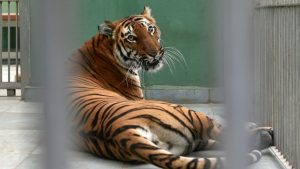
All four zoos run by the Wildlife Conservation Society in New York City, including the Bronx Zoo, have been closed to the public since 16 March. New measures will now be put in place to protect the animals and their caretakers at all the facilities.
What do we know about animals and the virus?
 This coronavirus was first detected in humans in the Chinese city of Wuhan late last year.
This coronavirus was first detected in humans in the Chinese city of Wuhan late last year.
The coronavirus (called Sars-CoV-2, which causes the disease Covid-19) is thought to have originated in wildlife and been passed to humans via a live animal market in Wuhan.
The pandemic has been driven by human-to-human transmission, but the infection of Nadia raises new questions about human-to-animal transmission.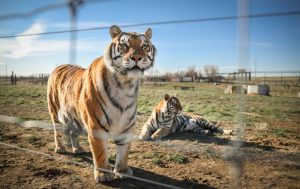
There have been less than a handful of isolated reports of companion animals testing positive for coronavirus, including two dogs in Hong Kong.
That is also the view of the World Organisation for Animal Health and the World Health Organization (WHO), which says there is no evidence that pet dogs or cats can pass on the coronavirus.
Just tested positive for thinking Carole Baskin fed her husband to those tigers. #TigerKing pic.twitter.com/O3uW8VL20q
— Jerry O’Connell (@MrJerryOC) March 30, 2020
The World Organisation Advice for Animal Health
It says studies are under way to understand the issue more. and urges anyone who has become sick to limit contact with pets.
Dr Sarah Caddy, Veterinarian and Clinical Research Fellow at the University of Cambridge, is among experts to respond to the reports.
“It is surprising that the tiger has become infected with what must have been a fairly low dose of virus – we can assume the tiger did not have continual close contact with the asymptomatic zoo keeper,” she said about the transmission.
“It is also interesting that the tiger showed clinical signs consistent with Covid-19 in humans. Although scientific proof is lacking, the chance this is just a coincidence is low.”
Conservation experts have warned that the virus could pose a threat to some wildlife like the great apes – and have said measures are needed to reduce the risk of wild gorillas, chimps and orangutans.
Animals Cant Transmit Covid-19 To Humans
The diagnosis the the first known case in any tiger in the world, and any animal in the US
Nadia, a four-year-old Malayan tiger, tested positive 
Animal experts say there is no evidence cats can transmit coronavirus to people, after a tiger tested positive for the virus at a zoo in the US.
The four-year-old female Malayan tiger named Nadia at the Bronx Zoo was tested after developing a dry cough and showing a decrease in appetite.
The Wildlife Conservation Society (WCS) said that the cats were infected by a person caring for them was a carrier for Covid-19, but was asymptomatic or had not yet developed symptoms. 
Six other cats at the zoo, including Nadia’s sister Azul, two Amur tigers and three African lions, were also suffering possible coronavirus symptoms.
Coronavirus sickened a tiger at the Bronx Zoo. Does that mean cats are at risk?
Tiger at the Bronx Zoo tested positive for the new coronavirus, a first that experts said underscores how much remains unknown about the virus and how it affects animals.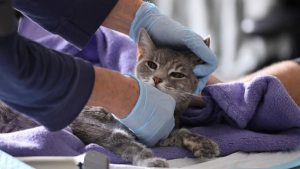
Evidence suggests that COVID-19, the disease caused by the new coronavirus, may have first infected humans via transmission at an animal market in Wuhan, China. Veterinary experts said more research is needed to understand the threat of a pet infecting its owner, even if it appears low.
“This is an important case because it is a natural infection,” said Karen Terio, chief of the Zoological Pathology Program at the University of Illinois’ College of Veterinary Medicine. “But a tiger is different than a domestic cat, and I can’t emphasize that enough.”
In “the first case of its kind,” a caretaker is believed to have transmitted the virus to Nadia, a 4-year-old Malayan tiger at the Bronx Zoo, the U.S. Food and Drug Administration said in a statement Sunday.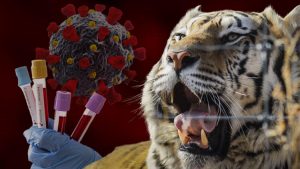
Nadia and several other tigers and lions at the zoo began showing respiratory symptoms, and the tiger was tested after meeting the necessary criteria for animal testing and getting approval from animal and public health officials, Terio said.
Leyi Wang, a veterinary virologist at the University of Illinois who studies coronaviruses in animals and received the test sample, said genetic tests showed the virus in the cat matched more than 99% to the virus in humans.
“Basically, it’s the same virus,” he said.
“Leyi Wang is a veterinary virologist at the University of Illinois with expertise in coronaviruses in animals. He created one of the tests used to analyze the tiger’s sample.” https://t.co/NGHbdfdYLR
— Allie Carnes (@dissuade) April 7, 2020
Can pets get the coronavirus?
Even before the confirmed case of COVID-19 in the tiger, the U.S. Centers for Disease Control and Prevention recommended that sick people limit contact with their pets if possible.
With tigers, “there’s a degree of social distancing that you automatically do,” Terio said. It’s possible the virus was transmitted via respiratory droplets or through fomites, such as the animal’s food, but the exact means of transmission is unknown, she said.
In Hong Kong, at least two dogs tested positive for the virus after close exposure with their owners who were sick with COVID-19.
“We don’t know whether any pets in the U.S. have a similar coronavirus or not. So there’s still more work needed to be done on the different animal species in terms of surveillance,” Wang said.
Terio said, “If you think about the number of people in this country and around the world that have been infected with this virus and have gotten very ill with this virus, and if you think about the number of people who have pet cats, the fact that we’re seeing the first case in a tiger, to me, suggests that there’s probably some differences in how even the different cat species respond to the virus.”
Terio explained that viral proteins and genetic differences in receptors that a virus uses to attack a person or animal differ between species, and those differences could cause the virus to be more severe in one species than another.
The ACE-2 receptor, or angiotensin-converting enzyme 2, is the enzyme in humans the virus uses as an entryway. ACE-2 receptors are similar in felines and humans, Terio said, but there are differences. And it’s not the same among all cats.
“There’s all sorts of different steps between getting exposed to a virus and developing disease that are going to depend on species,” Terio said. “And a tiger is a different species than a domestic cat and in a completely different family than dogs, so there’s a lot of potential differences and reasons for why you might see something in one species versus another.”
India works to ensure Tiger Zinda Rahe after New York big cat tests positive for Covid-19
Alarmed by a tiger in the US testing positive for coronavirus, authorities in several zoos have initiated preventive measures to protect the big cats from the infection.
The Central Zoo Authority in Delhi on Monday asked all the zoos across the country to remain on high alert and collect samples fortnightly of suspected cases in the wake of the US incident.



























